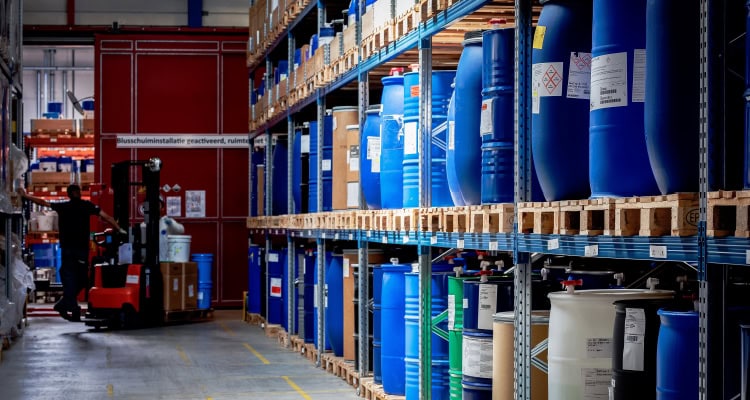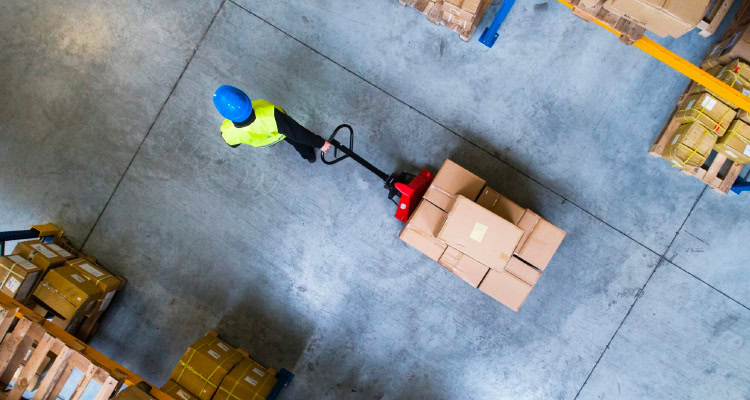Chemical Logistics: Providers Fuel Innovations

In response to the challenges ahead, chemical logistics providers are moving forward with innovative approaches and substantive solutions.
The chemical industry, like many other sectors, faces a challenging economy. The softness in the market has prompted some chemical companies to “retool and rebuild for the future,” says Will Schweda, senior vice president, global sales and solutions with Odyssey Logistics, which provides multimodal supply chain solutions. “Companies are looking at their plants and systems and logistics capabilities, and asking: ‘Are we doing the right things? How can we get better for when the economy does pop?’”
Some chemical companies, responding to the upheaval of the past few years, have become more open to new ideas and tactics. For example, they’re positioning their goods in different markets to be closer to customers, says Curt Gonya, senior vice president of KAG Logistics.
As some transportation companies and logistics providers have exited the market over the past year or so, that has opened opportunities for providers that survived and have the scale needed to provide coverage, Gonya says.
This shift has heightened the focus on logistics providers’ reliability and stability, given the significant costs customers incur if they need to switch providers.
Navigating the Driver Shortage
“The driver shortage is still an issue for carriers, but they aren’t feeling the pinch as severely as they have in the past,” says James Cordock, president of Bulk Connection, a bulk freight third-party logistics provider.
Some chemical manufacturers are working to become “shippers of choice” by helping carriers maximize capacity utilization and cut operating costs, says Rupal Deshmukh, partner in the strategic operations practice of Kearney. Among other benefits, shippers of choice often can secure capacity at more competitive rates.
Regulatory Requirements Accelerate
A portion of the disruptions in the chemical logistics sector come from increased regulatory scrutiny, mainly on safety and environmental concerns, says Scott Buber, director of operations, chemical division and regulatory compliance with WSI, a supply chain solutions provider.
For instance, some states are enacting more requirements for cleaner vehicle air emissions. While understandable, particularly in areas with heavy traffic, these requirements can also increase transportation costs, Buber says.
The growing volume of regulations limits flexibility across chemical manufacturers’ supply chain networks. “It’s hurdle after hurdle,” Gonya says. “To address these obstacles, we put contingencies in place to make sure we can satisfy our customers’ requirements and deliver the goods on time.”
New and changing regulations pose particular challenges for the 98% of chemical distributors that are small businesses, says Eric R. Byer, president and chief executive officer with the Alliance for Chemical Distribution (ACD).
For example, changes to the Occupational Safety and Health Administration’s (OSHA) Worker Walkaround Representative Designation Process are prompting concerns, Byer says, referring to a final rule OSHA published in March 2024.
Historically, both employers and employees had the right to authorize a representative to accompany OSHA officials during workplace inspections. Under the new rule, workers may authorize another employee or a non-employee to serve as their representative. Non-employee representatives must be reasonably necessary to conduct an effective and thorough inspection, based upon their skills, knowledge, or experience, OSHA says.
The updated rule gives “unauthorized individuals sweeping access to facilities’ sensitive inner workings and chemical processes,” Byer says. OSHA hasn’t shown how the change improves safety, he adds.
On a positive note, the chemical logistics sector is starting to gain more seats at the regulatory table, and regulators are more willing to listen and do site visits, Buber says. These visits offer logistics providers the opportunity to show how they’re meeting regulatory requirements.
Continuing to show regulators that chemical logistics companies have prudent plans in place for handling products will enable them to continue to gain greater access to EPA representation, Buber says.
Sustainability Initiatives Gain Momentum
“Until a few years ago, sustainability was just a buzzword,” Buber says. Now, the focus on sustainability has become more substantial and permanent. “There are a ton of changes, a ton of expectations, and a ton we don’t know yet,” he says.
Among other shifts, companies are exploring more sustainable packaging materials. Many also are assessing their carbon footprints and identifying ways to be more energy efficient and greener in transporting products, Buber says.
ACD’s Responsible Distribution program, a comprehensive set of environmental, health, safety, security, and sustainability standards, now incorporates a sustainability code. Understanding evolving sustainability practices and incorporating the standards into business planning have become critical to ACD members’ success, Byer says.
Technology Presents Opportunities
The chemical industry is a data-driven space. Yet few large chemical manufacturers have access to granular, actionable data that can help them make informed decisions, Schweda says.
Many providers work from multiple ERP systems, so information often is scattered across different solutions. In addition, it’s often difficult to access data that can inform actions, Schweda adds.
For instance, companies may have visibility to their full logistics costs, but not costs at the shipment level. “Without this data, it’s difficult for companies to take action to improve operations and manage costs effectively,” Schweda says.
Artificial intelligence (AI) promises to help. In the logistics industry, success often lies in speed and adaptability, says Maneet Singh, chief information officer with Odyssey Logistics. Artificial intelligence can help by enabling companies to efficiently optimize complex processes to add value for their customers.
One key to the successful deployment of AI is an organization’s data science capabilities, or its ability to extract knowledge and insights from data, Singh says. All systems, from ERP to billing solutions, generate quantities of data. AI can offer a streamlined way to analyze and optimize it.
“You don’t have to rely on a person knowing, for instance, the best route to get from Chicago to Memphis,” he says.
While the current economy is difficult for many businesses, the outlook for the chemical logistics sector, which employs more than 75,800 and has a direct economic impact of $27.55 billion, is promising. New chemical production in the United States will result in more than 1 million more shipments annually, the American Chemistry Council estimates, citing announced investments of more than $200 billion, along with 330 manufacturing projects slated for the next decade.
The chemical logistics providers profiled here offer safe, resilient, sustainable, and cost-effective services.
Bulk Connection: On-Demand Freight Capacity for Bulk Shipping

Bulk Connection has one of the largest networks of bulk trucking companies in the industry, providing chemical companies with a one-stop solution for their bulk shipping needs.
No matter when clients reach out to Bulk Connection’s headquarters in Mystic, Connecticut, they will connect with a person.
“We’re a bit old school in that we like to use the phone and provide as much assistance as our customers require,” says Cordock, the company’s president. Phone calls leave less room for uncertainty, a vital benefit in the chemical logistics business, he notes.
Bulk Connection boasts one of the largest networks of bulk trucking companies in the industry. Since 1987, when the company was founded by executives with tanker truck companies who saw an opportunity to streamline sourcing for liquid bulk freight, Bulk Connection has leveraged its network and specialized knowledge of chemical products to offer shippers a one-stop solution for their bulk shipping needs.
Over the past three-plus decades, Bulk Connection has gained extensive experience brokering liquid bulk shipments of chemicals, paints, and other substances. As an ISO-9001-certified liquid bulk freight broker, it knows how to provide consistently safe, compliant shipments. The company’s bulk freight experts understand the details, from tank washing to unloading. They also can provide emergency services on demand.
Similarly, Bulk Connection offers deep experience in dry bulk shipments, including plastic pellets, silica sand, and other products. Its employees have developed strong relationships with the limited number of trucking companies that have proven they can handle these shipments with expertise and care.
When rail interruptions occur, Bulk Connection can lean into its network and knowledge to access and deploy the carriers and equipment that best match its customers’ needs. While this service typically costs more than rail transportation, it allows time-sensitive shipments to begin moving again.
Enhancing Efficiencies
Five years ago, Bulk Connection launched its proprietary Tank Wash Finder, an online tool that provides a comprehensive directory that includes information about cleaning and maintenance services performed at each site. “This detail can save drivers from wasting hours-of-service time by driving to the nearest tank truck wash only to find it can’t meet their needs,” Cordock says.
When partnering with clients in a managed transportation relationship, Bulk Connection acts as an extension of their business, leveraging its network and experience to handle all the client’s bulk transport needs. Among other responsibilities, Bulk Connection obtains quotes, vets carriers, and manages paperwork. Shippers often save money and time, lower their risk, and can better meet customers’ needs.
In working in a managed transportation relationship with a manufacturer of chemical products distributed across the United States, Bulk Connection took over all liquid bulk shipping. It sourced and booked liquid bulk loads, vetted carriers, ensured information was current, and followed up with key personnel at loading and unloading sites to confirm that they were prepared to receive drivers. The shipper gained the expertise of an ISO-9001-certified bulk freight specialist as part of its team.
Bulk Connection even stationed one of its employees at the company’s headquarters. He developed an in-depth understanding of the shipper’s business, which informed his approach to his responsibilities.
The relationship continued for about nine years, until a merger at the chemical manufacturer brought it to a conclusion. During that time, the shipper’s liquid bulk transportation costs dropped by between 12% and 14%.
All Bulk Connection clients can benefit from the company’s expertise—many Bulk Connection employees have been with the company for 20-plus years—and commitment. “Whatever chemical you’re shipping, chances are we know it well and know what it takes to ship it safely,” Cordock says.
KAG Logistics: Industry-Leading Transportation Management Solutions

With its experienced personnel and network of carrier partners, KAG Logistics can manage any shipment, regardless of its complexity.
KAG Logistics boasts a strong legacy in the chemical industry, where its network of experienced carrier partners and personnel can manage any shipment, no matter how complex. At the same time, KAG Logistics continues to add modes, including truckload, flatbed, transload, ground expedite, and others, to complement its liquid and dry bulk transport niche in the market.
The goal? “To follow the footprint throughout a customer’s supply chain and be there to support all their potential needs,” says Gonya, senior vice president.
Headquartered in North Canton, Ohio, and with three locations across North America, KAG Logistics also offers a range of transportation management solutions. These include multimodal transportation; capacity solutions including brokerage; carrier management and procurement; technology applications; and dedicated managed account teams. Its logistics services include cross-border solutions; inventory optimization and management; transloading; and consulting and supply chain design.
KAG Logistics’ dedicated managed transportation services encompass people, processes, and technology— all dedicated to exceeding customers’ requirements.
For instance, KAG Logistics might allocate equipment to a customer account, enhancing on-time service and reliability, capturing capacity, and providing more predictable costs, Gonya says. When it’s helpful, KAG Logistics will place an employee on-site at a customer location or dedicate resources within its own facilities.
Providing Visibility
With many client companies taking a just-in-time approach to inventory management, visibility has become critical. “Companies are running lean and planning their resources so they can get materials right into production,” Gonya says.
KAG Logistics’ Optimate transportation management system selects the right mode, equipment, and contract to safely and cost-effectively transport customers’ shipments, while also providing real-time shipment visibility, including control tower access to track all moving freight across all carriers.
In addition, dedicated KAG Logistics personnel can proactively identify, communicate, and manage shipment exceptions as early as possible to avoid supply chain disruptions. As a result, clients can be confident their supply chains are operating at peak efficiency, Gonya says.
The dashboard analytics solution KAG Logistics offers provides drill-down metrics and customizable reports. These can highlight carrier performance, financials, and key performance indicators, among other information, providing shippers with the information that helps them more effectively manage their day-to-day business needs.
In working with a company that was looking to improve the resiliency and reliability of its supply chain to better manage volatility, KAG Logistics’ solutions and engineering team developed and implemented a multi-channel/multi-mode solution.
The company was able to shift from a single-channel/single-mode shipper and place its product closer to its customer base throughout the United States. “This allowed the shipper to react more quickly to its customers’ needs while improving service expectations,” Gonya says.
In logistics, remaining ahead of customers’ needs and ensuring stability and reliability is always top of mind. “This guides our roadmap and investment in technology as well as our recruiting,” Gonya says, noting that KAG Logistics strives to ensure its solutions drive efficiency and processes, so its clients can continually boost their own resilience and performance. “Then, they’re positioned to grow and capture market share,” he adds.
As important, KAG Logistics itself is a stable, resilient organization. “That’s what customers are looking for, after all we’ve gone through,” Gonya says.
Odyssey Logistics: Transforming Complexity Into Opportunity

With more than two decades of experience in the chemical industry, Odyssey Logistics offers expertise, technology, and global reach to provide customers with a competitive edge.
Odyssey offers clients more than two decades of experience in the chemical industry. “Our first customer was a global chemical manufacturer looking for a logistics partner,” says Schweda, senior vice president of global sales and solutions.
Odyssey’s employee roster, which has grown from five to more than 2,000 people, includes many chemical engineers. Its chemical logistics services are built to address today’s supply chain challenges and ensure chemical shipments move safely, sustainably, and on time.
Several capabilities distinguish Odyssey’s chemical logistics practice, including its technology and global reach, both of which help customers gain a competitive edge. Odyssey’s transportation management system works across multiple regions of the world, various currencies, and all modes of transportation, Schweda says. Modules include route optimization, carrier selection, tendering, and others.
Odyssey also offers expertise in handling sample orders—which often lead to larger orders. It has successfully processed more than 14 million sample shipments for 65-plus major manufacturers.
Among other services, Odyssey’s experts can help chemical manufacturers identify the optimal packaging, comply with relevant regulations, manage inventory, and access detailed, actionable reporting. All sample orders ship within 48 hours of order receipt; 95% ship within 24 hours.
Odyssey has also adopted a five-part roadmap for AI readiness and technological resilience: reducing risk, mitigating technology debt, improving productivity, streamlining customers’ experiences, and unifying data governance. By following this roadmap and leveraging AI-powered technologies and the right tools, Odyssey is improving its business processes to boost efficiency, create a unified customer experience, and add even greater value to customers, says Singh, chief information officer.
Odyssey also is moving toward its vision of One Odyssey, integrating services across its four divisions: intermodal, transport and warehouse, integrated marine logistics, and managed services. The aim is to increase transparency for customers and enable them to more easily leverage Odyssey’s expertise.
Odyssey is a Responsible Care® partner company and a member of the European Chemical Industry Council (CEFIC). Both these memberships reflect Odyssey’s enduring commitment to safe logistics practices.
Leveraging Expertise
One example of Odyssey’s expertise is shown in its work with a global chemical producer that has 15,400 employees in 33 countries, 60 production sites around the world, and 11 business units in North America. The company ships products and runs warehouses across the continent, and imports materials from overseas that it distributes within North America.
To move its products to its customers, the manufacturer utilizes rail, International Organization for Standardization (ISO) tanks, bulk trucks, and package trucks—all of which are outsourced because it doesn’t own its own fleet. The manufacturer was managing transportation routing through its own transportation management system and working with a third-party provider to audit and pay its carrier freight bills. These arrangements created significant visibility gaps, particularly in trying to align freight audit and payment functions.
By partnering with Odyssey and leveraging its customized solution, the manufacturer has gained real-time, accurate visibility to transportation data. Its freight moves more efficiently and the company has been able to cut its transportation spend.
Results like these help Odyssey consistently post double-digit growth rates.
WSI: A World-Class Chemical 3PL

Monitoring the movement of products at every stage, WSI provides companies with the confidence their shipments are being handled carefully and responsibly.
In working with its clients, WSI, a Responsible Care® Partner, strives to apply solid business sense to its operations, while also fostering sustainability, the environment, employees’ well-being, and the company’s presence in each community.
“Every company seeks to make money. We’re trying to do this in a way that enhances these areas,” says Buber, director of operations, chemical division and regulatory compliance.
The goal is to ensure the company operates in ways that employees and others can trust. Then, should they see a toxic symbol on a product, they can be confident it’s being handled carefully and responsibly. To that end, WSI’s services can help chemical companies improve their operations by consolidating storage and labor needs, reducing costs, meeting scalability challenges, and boosting operational flexibility, among other benefits.
The services WSI offers include bulk storage and transfer and versatile packaging options, including drums, totes, pails, boxes, bags, and super sacks. WSI can provide flammable-rated storage and temperature-controlled rooms, as well as packaging, repackaging, relabeling, fulfillment, dilution, and transportation services.
It offers blending services, as well as live load transfers of products from tankers or railcars and into above ground storage tanks or back into tankers. Many services can be offered at the client’s facility or at WSI’s buildings.
A key differentiating capability is WSI’s emergency response services. “For any site-level issues, we have our own internal emergency response teams,” Buber says, noting that few chemical logistics providers offer this.
To offer this service, WSI has partnered with several agencies, including the Environmental Protection Agency and OSHA, and developed an in-house training program. As a result, it’s able to train both its own teams, and its partners’ and customers’ teams, Buber says.
WSI’s newly updated warehouse management system can provide real-time information on transactions, while also tracking all activity relating to an operation, such as delivery times. WSI has a robust documentation and tracking system to monitor the movement of hazmat products at every stage of the supply chain. Users can sort shipments by product, commodity type, hazard class, and other attributes to quickly check their status. “This takes a lot of the guesswork out of formerly manual processes,” Buber says.
Providing Exceptional Service
WSI worked with a distributor of industrial lubricants whose previous logistics provider was not fully complying with safety and environmental requirements. The previous provider was also reluctant to accommodate the customer’s desire for a bulk transfer facility, which would enable the distributor to reduce its transportation costs and expand its service capabilities.
WSI partnered with the distributor to set up a bulk transfer facility at WSI’s Dallas warehouse. This allows the distributor’s customer to buy products in bulk and ship them by the truckload, capturing significant savings.
As part of this operation, WSI pumps the chemicals from the truck, transfers them to drums or totes, and maintains an inventory from which it can fill customers’ orders. Having the product on the shelves allows the distributor to respond more quickly to its customers in the area, while also pursuing a new customer base.
As it prepared to offer this service, WSI researched local codes, obtained the appropriate permits, and participated in multiple inspections. It worked with its engineering group to build a containment berm around the dedicated loading dock. To accommodate the required heavy-duty compressors, WSI upgraded the electrical system. Employees at all levels completed HAZWOPER (Hazardous Waste Operations and Emergency Response) training.
It’s one example of WSI’s goal of becoming a world-class chemical 3PL, first in the nation and then across the globe. “That’s a lot, but that’s our drive,” Buber says.
Chemical Logistics RFP
"*" indicates required fields
